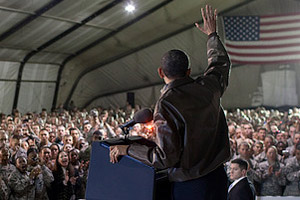
<a href="http://commons.wikimedia.org/wiki/File:US_soldiers_stuck_in_sand_in_southern_Afghanistan.jpg">US Military/Wikimedia</a>
![]() This story first appeared on the TomDispatch website.
This story first appeared on the TomDispatch website.
When I try to figure out why we are still in Afghanistan, though every ounce of logic says we ought to get out, an unexpected conversation I had last year haunts me. Doing neighborhood political canvassing, I knocked on the door of a cheerful man who was just about to tune in to his favorite radio show: Rush Limbaugh. He was kind enough to let me stay and we talked.
Conservatives are often the nicest people—that’s what I told him—the ones you’d like to have as neighbors. Then I said: I bet you’re always willing to help your neighbors when they need it. Absolutely, he replied.
So why, I asked, don’t you to want to help out people across town who have the same needs, even if they’re strangers? His answer came instantly: Because I know my neighbors work hard and do all they can to take care of themselves. I don’t know about those people across town.
He didn’t have to say more (though he did). I knew the rest of the story: Why should I give my hard-earned money to the government so they can hand it out to strangers who, for all I know, are good-for-nothing loafers and mooches? I want to be free to decide what to do with my dough and I’ll give it to responsible people who believe in taking care of themselves and their families, just like me. I’ll give my money to the government only to protect us from strangers in distant lands who don’t believe in the sacred rights of the individual and aim to take my freedom and money away.
What a story it is—a tale of mythic proportions! As an historian of religions, I was trained to appreciate, even marvel at the myths people tell to make sense out of the chaos of their lives. So I can’t help admiring the conservative myth: so simple yet all encompassing, offering clear and easy-to-grasp answers that cut through the everyday complexities besetting us all.
Of course, the answers are far too simplistic, as stupid (in my opinion) as they are dangerous. But I was also trained to be non-judgmental and to admire the power of a myth even when I find it morally abhorrent. And this one is impressive, with its classic good-guys-versus-bad-guys plot line turned into a stark political tale of freedom versus slavery.
White Americans, going back to early colonial times, generally assigned the role of “bad guys” to “savages” lurking in the wilderness beyond the borders of our civilized land. Whether they were redskins, commies, terrorists, or the Taliban, the plot has always remained the same.
Call it the myth of national security—or, more accurately, national insecurity, since it always tells us who and what to fear. It’s been a mighty (and mighty effective) myth exactly because it lays out with such clarity not just what Americans are against, but also what we are for, what we want to keep safe and secure: the freedom of the individual, especially the freedom to make and keep money.
The President Trapped in a Myth and a War
No politician who aspires to real influence on the national level can afford to reject that myth or even express real doubts about it, at least in public, as Barack Obama surely knows. Not surprisingly, President Obama has embraced the myth in his most important speeches: The bad guys are always out there. (“Scripture tells us that there is evil in the world.”) The good guys have no choice but to fight against the evildoers. (“Force may sometimes be necessary.”)
 Because every myth has variants, though, politicians can still make choices. In Obama’s version of the myth, the federal government can be a force for good. So he has a domestic fight on his hands every day against right-wingers who cast the government as an agent of darkness.
Because every myth has variants, though, politicians can still make choices. In Obama’s version of the myth, the federal government can be a force for good. So he has a domestic fight on his hands every day against right-wingers who cast the government as an agent of darkness.
He’s not likely to stand a chance of winning that battle if he tries to take on the myth of national security as well. Bill Clinton once put it all-too-accurately: “When people are insecure”—which is exactly when they rely most on their myths—”they’d rather have somebody [in the White House] who is strong and wrong than someone who’s weak and right.”
That’s a truth everyone in the room undoubtedly had in mind back in the fall of 2009 when the top military field commanders came to the White House to talk about Afghanistan. Where else, after all, could our military act out the drama of civilized America staving off the savages? And what better-cast candidates for the role of savages could there be than the Taliban and al-Qaeda?
The generals who run the war also had to confront another vital question: Could they still act out some contemporary version of the myth of good against evil? They’ve given up on the possibility of victory in Afghanistan. So there’s no real chance to go for the classic version of the myth in which the good guys totally vanquish the bad guys.
But since the Cold War era, the myth has demanded only that the good guys don’t lose—that they merely “contain” the evildoers who “hate our freedoms” (especially our freedom to make and keep money) and will swoop down to destroy us if we give them the chance.
These days the generals must sense that even the containment version of the myth is in trouble. Their predecessors failed to enact it in Vietnam, and though the judgment of history is still out on the Iraq War, it’s looking ever more dim, too. If the US loses in Afghanistan, the American public might abandon the myth that justifies the military establishment and its gargantuan budget. As a result, the generals prefer to fight on eternally.
President Obama is trapped at this point. He risks losing both a war and a presidency. Yet if he tries to ease up on the war accelerator, he knows he’ll be pilloried by an alliance of military and right-wing forces as a “cut-and-run” weakling.
If he’s ever tempted to forget that domestic political reality, the mass media are always ready to remind him. Just glance at the 145,000 Google hits on “Obama wimp.” Even his liberal friends at the New York Times have asked in a prominent headline, “Is Obama a Wimp or a Warrior?”
Within the confines of the national insecurity myth, of course, those are the only two options. If pressure is ever going to develop to get US troops out of Afghanistan, progressives will have to offer a new option that actually speaks to Americans.
To Myth or Not to Myth
And there’s the problem. Myths are like scientific theories. No mountain of facts and logic, however convincing, can change believers’ minds—until a more convincing myth comes along.
A handful of progressive political thinkers are trying to persuade the American left to understand this truth and start offering new political myths (their technical term is “framing narratives”). George Lakoff is probably the best known. His books are bestsellers. His articles on websites invariably go to the top of “most read” and “most emailed” lists. Yet he can’t seem to make much of a dent in the actual policies and practices he’d like to change.
Progressives still shower the public with facts and arguments that are hard to refute, as (in the case of the Afghan War) the American people know. After all, more than 60% of them now tell pollsters that the war was a “mistake.” Yet the war goes on and progressives remain the most marginal of players in the American political game because they don’t have a great myth to offer. In fact, they’ve hardly got any good ones.
Political scientist David Ricci claims there’s not much progressives can do about it, precisely because they already have one very successful myth that prevents them—oh, the irony!—from taking the power of myths seriously. The progressive heritage, as he tells it, goes back to the eighteenth century Enlightenment, when the radicals of the day decided that fact and logic were the source of all truth and the only path to peace and freedom.
The Bible and all the other ancient tales bind us to the past, they argued. As a result, humanity was letting dead people lock us into the injustices that bred endless war and suffering. It was time to let human reason open up a better future.
If progressives believe they are myth-less, though, they’re blind to the one mythic plot they share with the rest of America: good against evil. Progressives act out that myth on the political battlefield every day, passionately fighting to defeat right-wing evildoers.
The problem is (and forgive me for repeating an old anti-left cliché of the 1960s, but it’s true here): the progressives’ political myth tells only what they’re against, not what they’re for.
In fact, deep down, most progressives do have a dim sense of their deepest principles: the Enlightenment ideals of peace, freedom, and equality based on the Romantic ideal of what Lakoff calls empathy, extended to all humanity and the biosphere as well.
But progressives don’t wrap their policy prescriptions in mythic language that says clearly, simply, and patriotically what they’re for. As a result, they can’t compete with the myth of national insecurity. They’ve got nothing to offer in its place, which is at least one reason why, despite growing opposition to the Afghan War, they can’t build a strong enough constituency to help—or force—Obama to end it.
All they can do is demand that he sacrifice his domestic agenda, and—no small matter for any politician—his second-term chances, on the altar of principle. As a result, they end up in a political never-never-land, which might feel good but isn’t going to save a single Afghan life.
No individual, much less a committee, can sit down and create a new myth. Myths grow organically from the life of a community. Progressives would find their myth emerging spontaneously if they just spent a lot more time thinking and talking about their most basic worldview and values, the underlying premises that lead them to hold their political positions with such passion.
A strong progressive myth could make it safer for a president to change course and perhaps save his presidency. Failure to stave off the bad guys destroyed Lyndon Johnson and gravely wounded George W. Bush. I suspect Obama would love to have a great progressive myth keep him from a similar fate. He won’t create it, but he’d probably be delighted to see it appear on the horizon.
Ira Chernus is Professor of Religious Studies at the University of Colorado at Boulder and author of Monsters To Destroy: The Neoconservative War on Terror and Sin. To listen to Timothy MacBain’s latest superb TomCast audio interview in which Chernus discusses “us versus them” and “us with them” myths, click here or, to download it to your iPod, here. He can be reached at Chernus@colorado.edu.

















